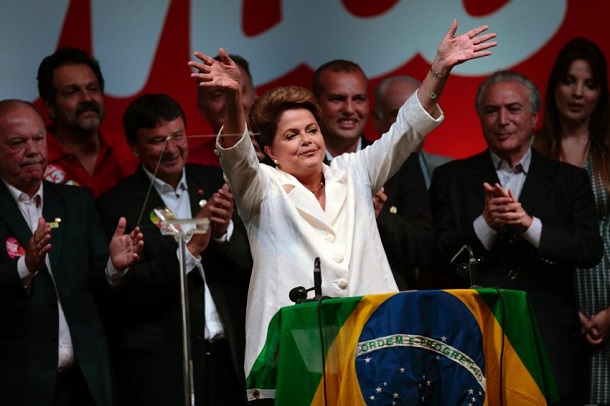Incumbent Dilma Rousseff has won Brazil’s presidential election in short supply. But for the start of the new term is ill-equipped.
A crack goes through Brazil. It runs pretty much along the geographic border between the North and Northeast and the rich south and southeast, but he also takes place across the company.
North and Northeast have overwhelmingly elected President Rousseff, in some states with more than 70 percent. In the economic center of the country, the rich and populous state of São Paulo, opposition candidate Aécio Neves, however, has brought 67 percent, also in the south, he is far ahead of the incumbent.
The fact that it has still not passed, is primarily due to Neves’ home state of Minas Gerais, which he ruled as governor twice. The Mineiros, as the inhabitants are called, had given her compatriot in the first ballot, three weeks before a discharge. In the second round he failed to make up for the losses.
Brazil are now before four turbulent years. Only about three million votes is the projection for Rousseff, with 51.65 percent fell from her victory narrowest of margins. Since the first free presidential elections in 1989, the country was not so divided. Rousseff’s political godfather Lula and her campaign manager João Santana, the polarization had been fueled in recent weeks, Lula compared the opposition even with the Nazis. The wounds has beaten this campaign will not soon heal.
On the rugged and authoritarian Rousseff now comes to a task for which it is ill-equipped by their personality ago: She wants to reconcile the divided country. In the white dress she performed on Sunday night in a hotel in the capital Brasília before their followers. Demonstratively hugged her main poll workers, ex-President Lula, and thanked the “activists number one”. In recent weeks, confidante had persistent reports of tensions between the two.
From a lectern, which was decorated with the Brazilian flag, Rousseff called on their compatriots to the unit, they spontaneously broke into the national anthem. “This president here is open to dialogue,” she said. They sat down for a referendum on a reform of the political system a, they said – and took it again on a central demand of the protest movement, which had rocked the country in June last year. At that time, their advance had failed in the Congress.
Brazil Elections:Rugged, but honestly – this reputation is at stake
The opportunities for political reform are, however, in the new Parliament bad: The political landscape has become more fragmented, many MPs are implicated in corruption scandals. Million Brazilians despise the political class: About 20 percent of voters did not show up at the polls, even though voting is compulsory.
New revelations about the involvement of government officials in the massive corruption scandal involving the parastatal oil company Petrobras also undermine confidence in the President. The currency trader Alberto Yousseff, a central figure in the affair, opposite the prosecutor stated that Rousseff and her predecessor Lula knew of illegal money jacking the oil company – which tells the magazine “Veja” in its latest edition. If these allegations prove to be true, it runs the risk an institutional crisis.
So far, Rousseff was as gruff but honest, now is their reputation at stake. The Petrobras scandal has developed an incalculable explosive power, he shook the Republic to its foundations. The spirit of optimism that conjured Rousseff after her election victory, could already be gone before she takes up her new mandate on 1 January.
[adrotate banner=”63″]

